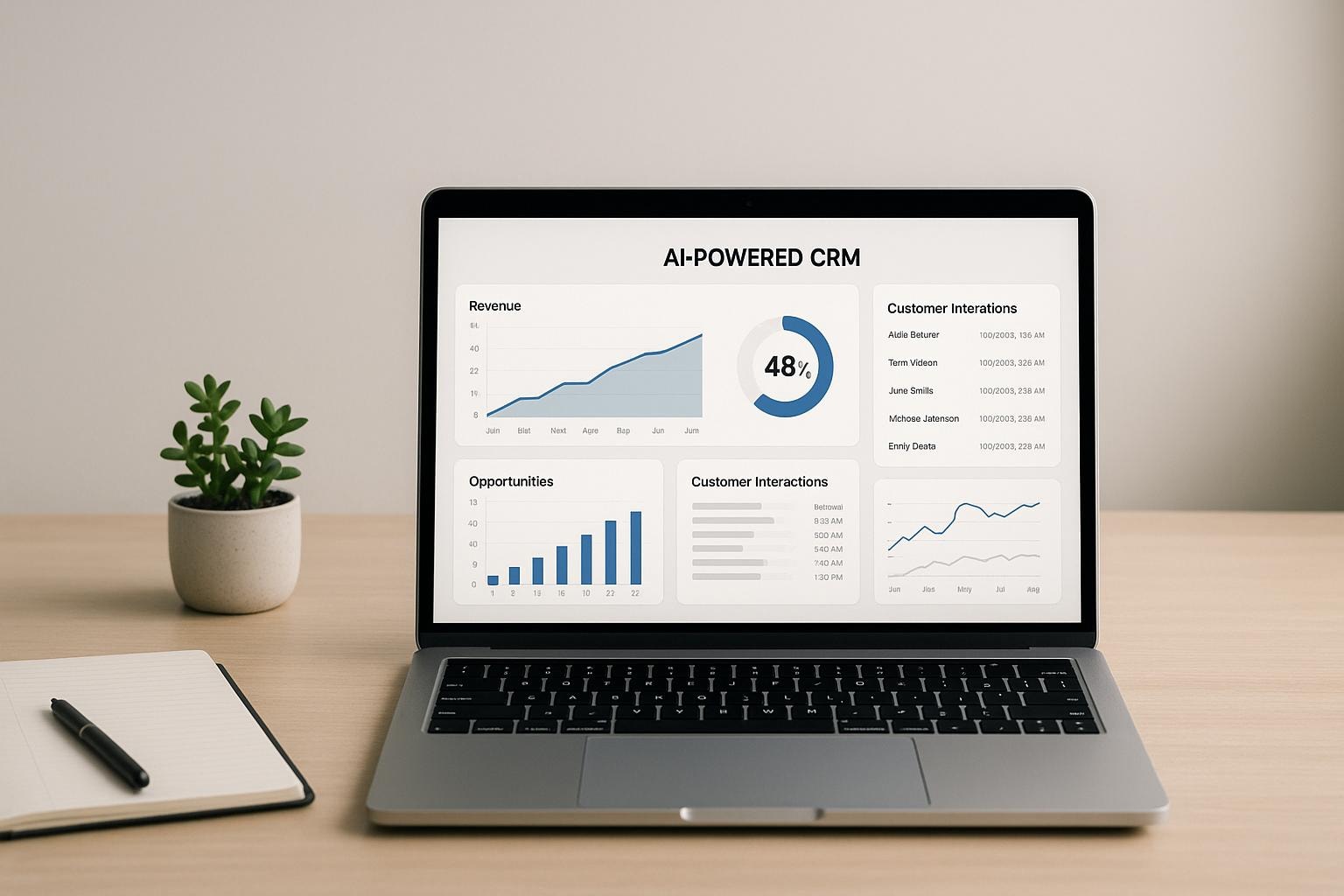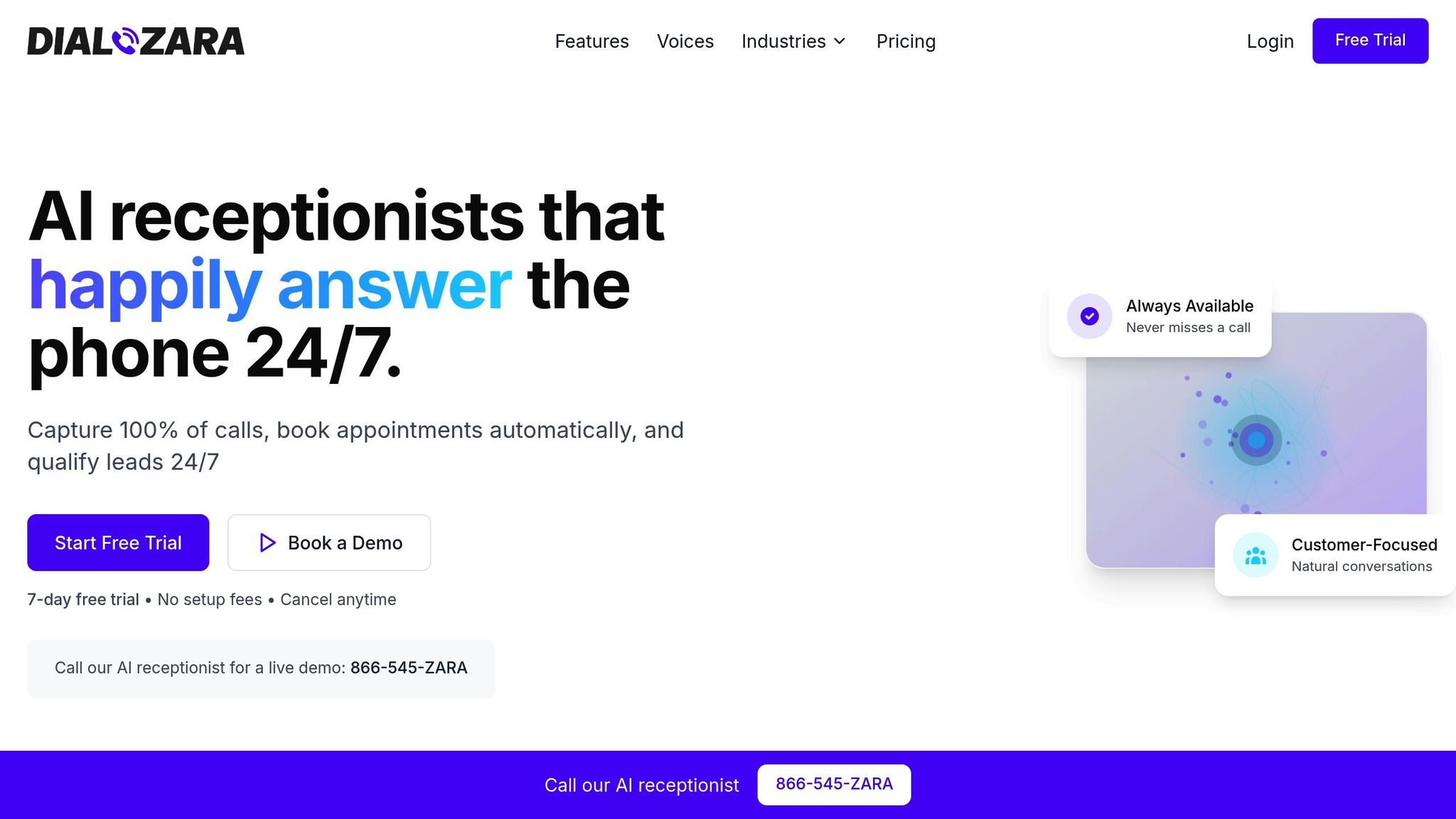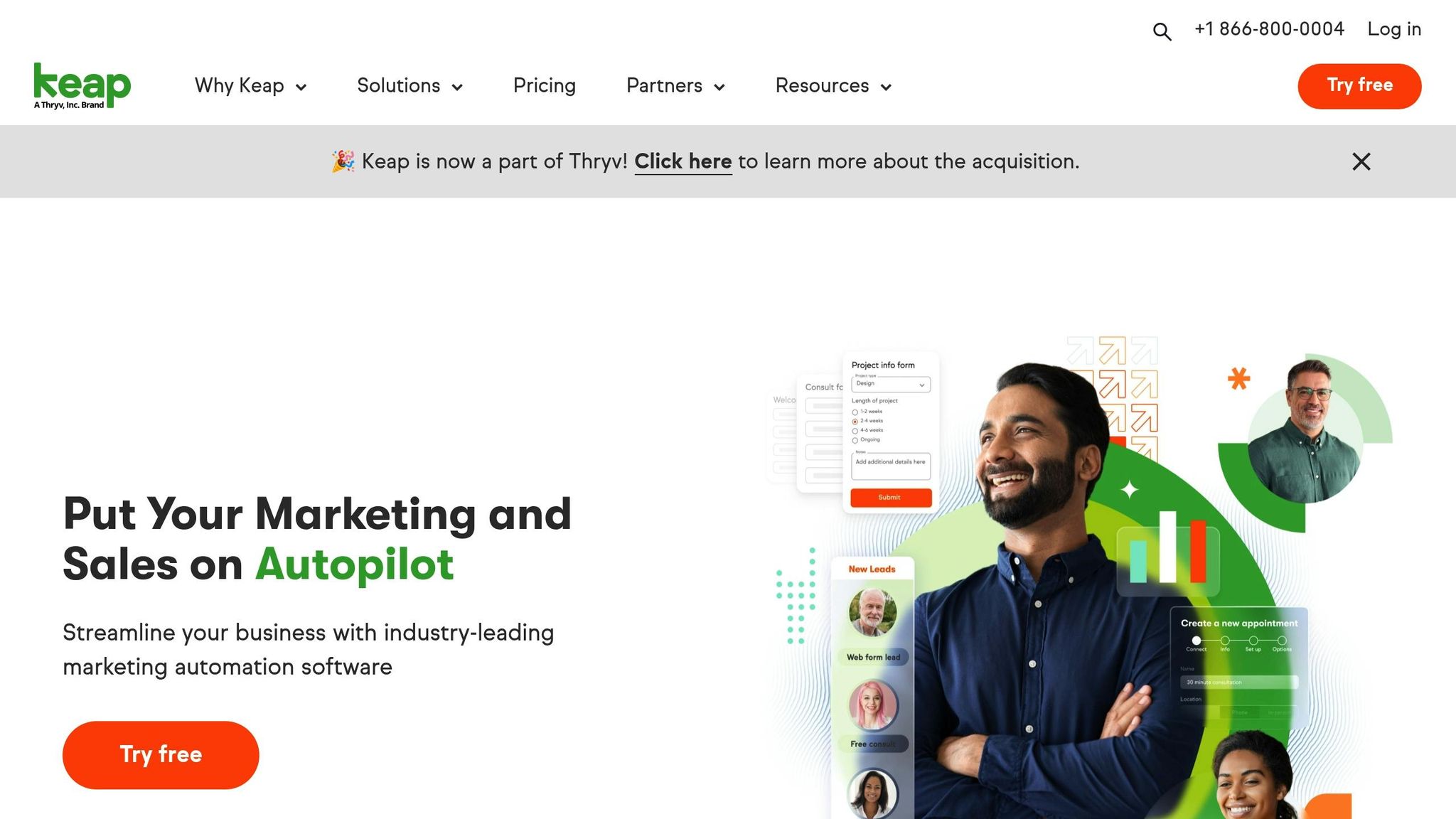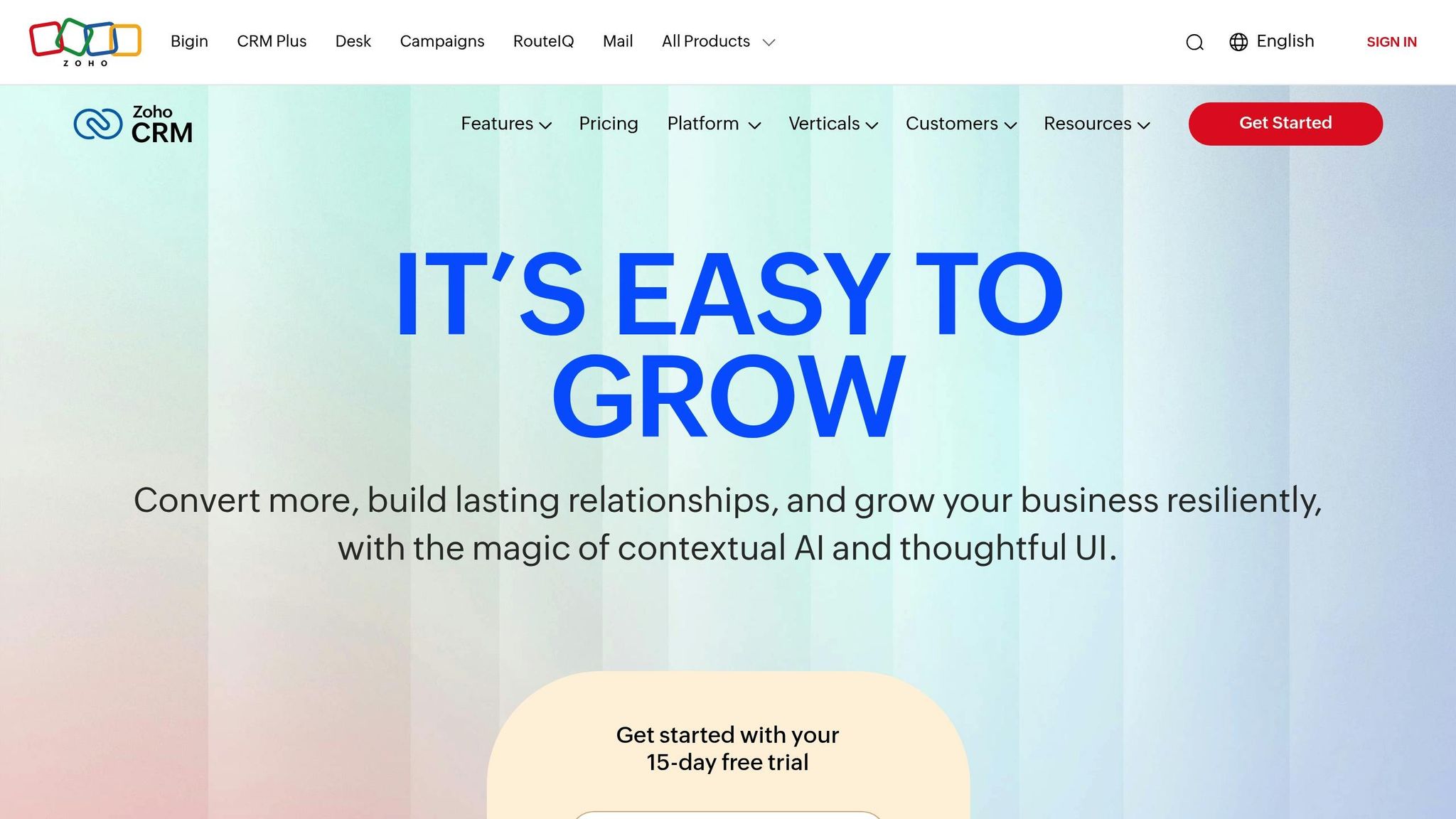
AI-Powered CRM for SMBs: What to Know
Save 90% on staffing costs while boosting productivity 40% with AI that handles customer calls, data entry, and follow-ups automatically.

Written by
Adam Stewart
Key Points
- Cut routine tasks by 40% - AI handles data entry and call scheduling for you
- Reduce missed calls by 70% with 24/7 AI phone support that never sleeps
- Track customer interactions across phone, email, text in one simple dashboard
- Spot unhappy customers early with AI that reads tone and flags concerns
AI-powered CRMs help small businesses save time, reduce costs, and improve customer relationships by automating repetitive tasks and providing data-driven insights. Here's what you need to know:
- What It Does: Automates data entry, tracks customer interactions, predicts behavior, and suggests actions.
- Why SMBs Need It: Handles limited resources and scattered communications, freeing up time for growth.
- Core Benefits:
- Saves costs by automating routine tasks.
- Works 24/7 to handle customer inquiries.
- Analyzes customer behavior to improve decision-making.
- Scales with your business without adding staff.
- Integrates with existing tools like accounting or marketing software.
- Top Tools for SMBs:
- Dialzara: Focuses on AI-powered phone communication.
- Keap: Automates sales and marketing processes.
- Zoho CRM with Zia AI: Offers advanced features at a low cost.
AI-powered CRMs are becoming essential for SMBs to stay competitive, with tools like Dialzara reducing missed calls by 70% and platforms like Zoho boosting sales productivity by 30%. Choosing the right CRM depends on your business needs, budget, and existing tools.
Core Features of AI-Powered CRM for SMBs
For small and medium-sized businesses (SMBs), finding the right AI-powered CRM can make all the difference. These tools are designed to tackle common hurdles like limited resources, scattered communications, and the constant need for efficiency. By automating processes and simplifying workflows, AI-powered CRMs help SMBs focus on what matters most: growing their business. Here’s a closer look at the features that make these systems essential.
Automated Task Management
One of the standout features of an AI-powered CRM is its ability to handle repetitive, time-consuming tasks. Did you know employees spend roughly 30–40% of their workday on routine activities? That’s a lot of lost time that could be better spent on strategic efforts.
AI-driven task management doesn’t just send reminders - it prioritizes tasks intelligently. For example, if a high-value client has an urgent concern, the system can flag it and assign it to the right team member automatically. This ensures that critical issues are addressed promptly.
The benefits are hard to ignore. Automation can boost productivity by up to 40%, reduce data entry errors by 25%, and improve overall efficiency by 30%. Plus, predictive tools take it a step further by analyzing customer behavior. Imagine an AI that schedules follow-ups for recurring orders without you lifting a finger - that’s the kind of efficiency SMBs need.
Multi-Channel Communication
Today’s customers expect seamless communication, whether they’re reaching out via email, phone, or social media. Without a unified system, these interactions can easily get lost in the shuffle, leading to delays and inconsistent service.
AI-powered CRMs solve this by consolidating all customer interactions into a single, comprehensive view. Whether a customer switches from an email to a phone call, the CRM keeps the entire communication history at your fingertips. This kind of transparency ensures smooth hand-offs and eliminates the frustration of repeating information.
What’s more, intelligent routing capabilities analyze incoming inquiries and direct them to the best-suited team member. This not only speeds up response times but also ensures customers get expert help right from the start. For small teams, this unified approach is a game-changer - especially when you consider that 63% of retail organizations now use AI to enhance customer service.
Customer Interaction Tracking
Understanding your customers is the foundation of any successful business, yet 60% of SMBs struggle to manage their customer relationships effectively. AI-powered interaction tracking changes the game by capturing and analyzing every touchpoint between your business and its customers.
These systems don’t just log what happened; they provide context. Metrics like email open rates, call durations, website activity, and social media engagement are all tracked. On top of that, sentiment analysis helps identify potential issues before they escalate. For example, if a customer’s tone in an email suggests dissatisfaction, the system can flag it for immediate follow-up.
Top AI-Powered CRM Solutions for SMBs
With the AI-powered CRM market projected to grow by 25% in the next two years, small businesses have a growing array of tools to streamline customer engagement and operations. Here are three standout platforms tailored to meet specific SMB needs.
Dialzara

Dialzara stands out by focusing on AI-powered phone communication rather than just customer data management. This virtual phone service operates around the clock, handling tasks like call screening and appointment scheduling with lifelike voice technology.
What makes Dialzara unique is its simplicity and cost efficiency. Setting up the system takes just minutes - create an account, answer a few business-specific questions to train the AI, select a voice and phone number, and enable call forwarding. For businesses dealing with missed calls or after-hours inquiries, this quick setup is a game-changer.
The platform can save SMBs up to 90% on staffing costs while managing high call volumes effortlessly. For instance, a U.S.-based legal firm reduced missed calls by 70% and improved client satisfaction by 50%, saving thousands of dollars annually.
Dialzara also integrates with thousands of business apps, enabling your AI phone agent to not only answer calls but also update your CRM, schedule appointments, and share key information with your team. Its ability to understand industry-specific terms and match your engagement style makes it a natural fit for industries like legal, transportation, insurance, real estate, healthcare, and financial services.
Keap

Keap is a strong choice for small teams looking to automate sales and marketing processes. Its standout features include automated follow-ups, workflow automation, and pipeline management, all designed to nurture leads effectively.
The platform's AI-powered contact management system organizes customer data and suggests the best times for outreach, helping small businesses maintain engagement with leads. By automating repetitive tasks like sending personalized messages and scheduling meetings, Keap allows teams to focus on revenue-generating activities.
Keap’s tools are particularly suited for small teams, even those without technical expertise. While its pricing is on the higher side, the time saved and improved lead conversion rates often justify the expense.
Zoho CRM with Zia AI

Zoho CRM with Zia AI offers a comprehensive suite of AI-driven features, combining affordability with robust functionality. Its capabilities include predictive analytics, lead scoring, sentiment analysis, and automated insights displayed on visual dashboards.
According to recent studies, businesses using Zoho CRM with Zia have seen sales productivity grow by up to 30% and customer satisfaction rise by 25%. For example, one small e-commerce business reported a 25% increase in sales conversions after implementing automated lead follow-ups and leveraging AI-driven insights.
Zoho’s pricing is another major advantage. With a free plan covering core features and paid plans starting at just $12 per user per month, it’s an accessible choice for startups and small businesses. The platform’s anomaly detection feature is particularly useful, alerting users to unusual patterns in customer behavior or sales data. Combined with a unified customer timeline that logs all interactions across channels, Zoho CRM ensures consistent and informed customer service.
Choosing the right platform depends on your business priorities. If phone communication is crucial, Dialzara offers unmatched convenience. For lead generation and nurturing, Keap’s automation tools are a great fit. And for a feature-rich CRM with advanced AI tools at a budget-friendly price, Zoho CRM with Zia AI is an excellent choice.
sbb-itb-ef0082b
How to Choose and Set Up an AI-Powered CRM
Picking the right AI-powered CRM isn’t just about finding a tool with fancy features - it’s about aligning the system with your business goals and ensuring a smooth setup. A thoughtful approach can make all the difference in how effectively the CRM serves your needs.
Assessing Your Business Needs
Start by identifying your biggest challenges and what you hope to achieve. Are you looking to handle a high volume of customer calls? Or maybe you need better email marketing automation? Pinpointing these priorities will help you narrow down your options.
Track your current customer interactions across all channels - phone calls, emails, and chat messages - for a typical week. This data will give you a clear picture of your needs. For instance, if you’re managing a large number of calls, a solution like Dialzara might be ideal. On the other hand, a more traditional CRM could be better suited for email and data management.
Don’t forget to consider industry-specific requirements. Things like compliance standards, security protocols, and communication preferences can heavily influence your choice.
Budgeting is another key step. Beyond the monthly subscription fee, think about setup costs, time spent on training, and any temporary productivity dips during the transition. While many businesses see positive results fairly quickly, the initial investment can vary depending on how complex the solution is.
Lastly, ensure the CRM integrates seamlessly with your existing tools. A smooth connection with your current systems, like email or accounting software, will save you a lot of headaches down the road.
Checking System Compatibility
Compatibility is crucial. Your new CRM should work effortlessly with the tools you already use, like scheduling apps, accounting software, or email platforms.
Use demos or free trials to test how well the CRM integrates with your current setup. For example, if you rely on a scheduling tool like Calendly, make sure the CRM can automatically sync appointment data. Some platforms offer simple CSV import options, while others provide dedicated migration support to make the switch easier.
Look for systems that offer APIs and robust integration capabilities. Even if you don’t need advanced integrations right now, having the option to add new tools as your business grows can be a game-changer.
Once your CRM is up and running, set clear benchmarks to measure its performance and impact.
Tracking and Improving CRM Results
Before rolling out the CRM, establish a baseline for key metrics like response times, customer satisfaction scores, missed call rates, and sales conversion percentages. These numbers will help you measure how well the CRM is improving your operations.
Keep an eye on performance indicators, especially during the early stages of implementation. Over time, many businesses see improvements in things like customer response times, lead conversions, and the cost of customer interactions.
User adoption is another critical factor. Monitor how often your team uses the system and identify any sticking points. If certain tasks are being skipped or workflows are breaking down, consider offering additional training or tweaking the system to make it more user-friendly.
To avoid overwhelming your team, roll out features gradually. Start with the basics, like contact management and call handling. Once your team is comfortable, introduce more advanced features like automated workflows and analytics.
Regularly review how the CRM is being used and look for ways to optimize. These check-ins can help you identify inefficiencies, validate the system’s value, and plan for future upgrades. By staying on top of these reviews, you’ll ensure the CRM continues to deliver meaningful results for your business.
Summary and Main Points
AI-driven CRM systems are proving to be a game-changer for small businesses, offering automation, cost savings, and better customer satisfaction. With 74% of U.S. businesses already using CRM systems by 2025, the move toward AI-enhanced solutions is a natural progression for companies striving to stay ahead of the curve.
These systems tackle a variety of challenges, from automating repetitive tasks like data entry to streamlining communication and delivering actionable insights. By taking over these time-consuming processes, AI-powered CRMs allow business owners to focus on strategic initiatives and nurturing customer relationships.
How AI Supports SMB Growth
AI-powered CRM tools are driving growth for small and medium-sized businesses (SMBs) by improving efficiency and cutting costs. Companies using these tools are 83% more likely to exceed sales targets, thanks to features like predictive analytics and automated lead scoring. For mobile CRM users, the benefits are even more pronounced, with a 150% higher likelihood of surpassing sales goals due to real-time updates and automated reminders.
The efficiencies gained from automation lead to significant cost reductions. Tasks such as data entry, scheduling follow-ups, and basic customer communications are handled automatically, reducing labor costs while improving accuracy. Generative AI also plays a role, enabling 34% of businesses to offer enhanced customer service through automated, tailored responses.
AI tools also boost customer satisfaction by ensuring timely, consistent interactions. Automated follow-ups, commitment tracking, and personalized experiences - powered by features like sentiment analysis - help businesses connect with customers more effectively. Research shows that companies using AI-driven CRM solutions can improve customer satisfaction by up to 25% and increase sales productivity by 30%.
The adoption of AI in CRM is on the rise, driven by these clear benefits. Analysts predict a 25% growth in AI use for CRM over the next two years, with 75% of businesses planning to expand their AI investments. For SMBs, adopting AI-powered CRM tools is quickly becoming a necessity to remain competitive.
Why Dialzara Works Well for SMBs
Dialzara stands out as a strong choice for SMBs by offering quick implementation and seamless integration with existing workflows. Its virtual phone answering service goes beyond traditional CRM capabilities, providing unique advantages.
The platform can reduce customer inquiry handling costs by up to 90%, eliminating the need for additional staff. Operating 24/7, year-round, Dialzara ensures no customer call goes unanswered, removing the hassle of managing HR and overhead expenses.
With compatibility across 5,000+ business applications, Dialzara integrates effortlessly into existing setups, allowing businesses to keep their current tools. Its AI agent adapts to industry-specific language and mimics each business's unique customer service approach, whether it’s for legal practices, healthcare providers, real estate agencies, or financial services.
The blend of cost efficiency, constant availability, and seamless integration makes Dialzara a compelling option for SMBs seeking sustainable growth in competitive industries.
FAQs
How can Dialzara's AI-powered CRM improve customer communication for my small business?
Dialzara's AI-powered CRM reshapes how small businesses manage customer communication by taking over tasks like answering calls, screening callers, and handling inquiries - no matter the time of day. This means your customers get prompt responses, even after hours.
Using lifelike AI voice technology, Dialzara creates a professional and personalized experience, helping to build trust and keep your customers happy. Plus, it works effortlessly with more than 5,000 business applications, making it easy to maintain consistent communication across multiple platforms.
By automating these tasks, Dialzara doesn’t just save you time - it can cut operational costs by up to 90%. This leaves you free to focus on growing your business while still delivering top-notch customer service.
What should small businesses look for in an AI-powered CRM to ensure it meets their needs and integrates smoothly with existing tools?
When choosing an AI-powered CRM, prioritize ease of use and how well it integrates with your existing systems. A seamless setup can save time and help your team adapt quickly while boosting overall efficiency. Be on the lookout for features like automation, analytics, and personalization, as these can directly support goals like enhancing customer engagement or simplifying daily operations.
It's also important that the CRM enables multi-channel communication and includes time-saving tools such as automated workflows or interaction tracking. These capabilities not only improve productivity but also elevate the customer experience, turning the CRM into a powerful tool for your business.
How does Dialzara's integration with other tools benefit small businesses?
Dialzara makes life easier for small businesses by working effortlessly with more than 5,000 apps and VoIP platforms. This integration means businesses can automate tasks like handling calls, taking messages, scheduling appointments, and routing calls - all without interrupting their current workflows.
By connecting with popular business tools, Dialzara simplifies operations, cutting down on time-consuming manual tasks. The quick setup ensures businesses can stay focused on growth while delivering top-notch customer service.
Summarize with AI
Related Posts
Automation Software for Small Business: AI Integration
Learn how automation software and AI integration can streamline small business operations, enhance customer service, and fuel growth. Explore customizable workflows, CRM integration, marketing automation, and more.
Top AI Tools for Personalized Customer Service
Explore how AI tools enhance personalized customer service for SMBs, from chatbots to email marketing, while saving costs and improving efficiency.
AI Customer Service: SMB Competitive Advantage
Discover how AI-powered customer service can give small and medium-sized businesses a competitive edge. Learn about automating tasks, providing 24/7 support, personalizing experiences, and gaining data-driven insights.
AI Growth Forecasts for SMB Industries
Explore how AI is transforming small and medium-sized businesses, driving revenue growth, operational efficiency, and competitive advantage across industries.
